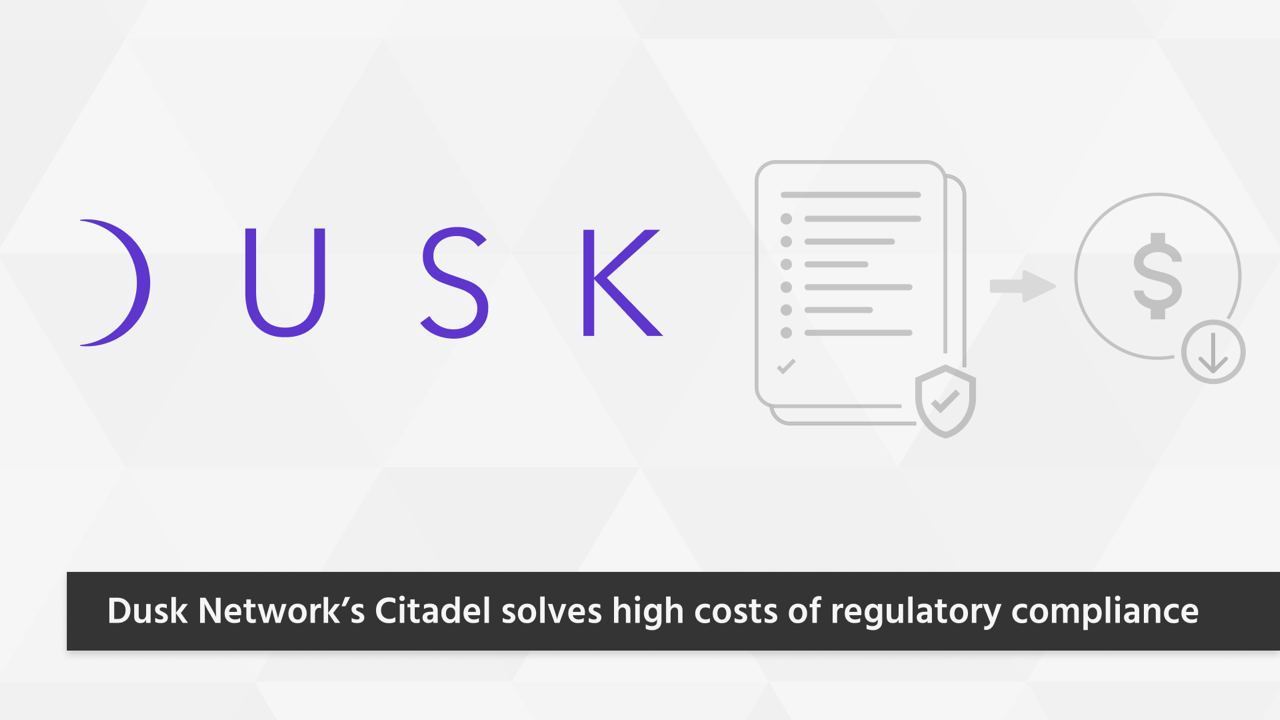Table of Contents
The importance of regulatory compliance has increased considerably. This has directly impacted the cost of staying compliant, which has become an expensive and, at times, inefficient affair.
Dusk Network’s Citadel KYC and AML solution helps companies by removing the burden of protecting, managing, and verifying data through the use of zero-knowledge proofs (ZKPs)
The Compliance Cost
The compliance cost refers to the total cost incurred by a firm to comply with applicable regulations in its area of operations. There are a wide variety of regulations with which a company may need to comply, , such as taxes, transportation, and the environment. In the case of financial institutions some of the most important regulations include include Know Your Customer (KYC), Anti-Money Laundering (AML), and Counter Terrorism Funding (CTF) regulations. They all have a significant impact on businesses, innovations, and users.
KYC and AML are vital in preventing financial crimes such as money laundering, terrorism funding, and identity theft. However, the processes used to manage them are inefficient and expensive. Users must upload considerable amounts of personal information, while businesses have to verify, secure, and protect this data. According to estimates, the cost of verifying a single KYC profile ranges between $13 to $130, while AML is expected to cost financial institutions $37 billion in the UK alone.
Cost Of Securing Data
Gathering and checking data is not the only expense incurred by institutions. These organizations also have to spend a significant amount of resources prrotecting the security of the data once it is verified. Several estimates state that banks spend around $88 million annually on securing user data. Furthermore, most organizations end up duplicating the work, with different institutions running essentially the same background checks across the board, resulting in the same work being done twice.
This is obviously very costly and inefficient, costing more prominent institutions additional funds and man-hours while preventing smaller institutions from competing with the bigger companies due to the high cost of doing business and staying compliant.
Non-Compliance Is Expensive Too
Institutions spend billions of dollars yearly to ensure they stay on the right side of the law. However, there is also a high cost for institutions that aren’t compliant. For example, institutions paid around $5 billion in fines for non-compliance in 2022. Big institutions can write off this expense as the “cost of doing business.” However, smaller institutions often don’t have the means to pay hefty fines should they fall foul of the law. This causes quite an impact on these institutions, especially when it comes to their reputations and operating costs.
Another consequence is that smaller institutions tend to become risk-averse, preferring to take up only pure “white bread” customers. While avoiding risk is an excellent strategy, institutions often turn away customers with even the smallest difficulties or inconveniences, such as multiple bank accounts in different countries. As a result, in an effort to comply with KYC and AML regulations, institutions end up rejecting perfectly viable applications.
As you can see, staying compliant is expensive, but not staying compliant could end up being even more expensive. Additionally, there are several other significant costs. Organizations can incur additional costs if a potential customer decides against completing time-consuming KYC/AML processes.. There is also the cost of lost resources, which could be put to other uses instead of requesting, storing, and verifying customer data. The third cost is to the economy because companies looked at the cost of compliance and decided not to go ahead with their venture, meaning as a whole we all miss out on increased innovation.
Such a scenario makes everyone lose out.
Introducing Citadel
Dusk Network has introduced Citadel as its one-and-done KYC and AML solution. Citadel lifts the burden of verifying, protecting, and managing personal data from institutions using zero-knowledge proofs (ZKPs). Such an approach drastically reduces the potential risks of hacks and data thefts. But what are zero-knowledge proofs? Zero-knowledge proofs allow individuals or institutions to prove that a particular statement is true without having to reveal the contents of the statement in question.
For example, let’s say you claim to have $1000 and wish to apply for a bank account. Typically, traditional methods would require you to provide statements to prove to the bank that you have $1000. However, using zero-knowledge proofs, you won’t have to give away any personal data or information. Instead, cryptographic proof is generated, which confirms the statement that you have $1000. That is all that is revealed to the bank, that you have the $1000 required to open an account.
Dusk Network has developed Citadel as an identity layer that companies can utilize. Users can complete their KYC once, following which institutions can access the Citadel identity layer and verify if a potential client meets their requirements. Companies do not have to worry about securing or verifying this data. If Citadel sees widespread adoption, it could significantly bring down costs involved in compliance and help bring more companies to the fore. All data would be encrypted with ZKPs, which reduces the possibility of data hacks or leaks, and institutions no longer have to replicate the same processes as Citadel becomes the go-to solution removing their need to continually verify and manage data. . Selective disclosure makes it possible for users to information they wish to share.
Disclaimer: This article is provided for informational purposes only. It is not offered or intended to be used as legal, tax, investment, financial, or other advice.
Investment Disclaimer










